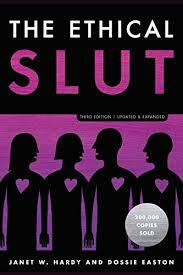You need to sign in or sign up before continuing.
Take a photo of a barcode or cover
1.03k reviews for:
The Ethical Slut, Third Edition: A Practical Guide to Polyamory, Open Relationships, and Other Freedoms in Sex and Love
Dossie Easton
1.03k reviews for:
The Ethical Slut, Third Edition: A Practical Guide to Polyamory, Open Relationships, and Other Freedoms in Sex and Love
Dossie Easton
Favorite Quotes:
“When a traditional marriage breaks up, nobody takes that as evidence that monogamy doesn’t work - so why do people feel compelled to take a slut’s breakup as evidence that free love is impossible?”
“Imagine how you’d feel if all the people who care about you made a practice of telling you so. Imagine what the world would be like if we allowed ourselves to recognize and acknowledge and communicate all the sweet feelings, to make the little gestures that may not be life changing or passionate but that nevertheless make life worthwhile.”
“We see ethical sluthood leading us to a world where we respect and honor each individual’s boundaries more than we honor any preconceived set of rules about what their boundaries ought to be.”
“When a traditional marriage breaks up, nobody takes that as evidence that monogamy doesn’t work - so why do people feel compelled to take a slut’s breakup as evidence that free love is impossible?”
“Imagine how you’d feel if all the people who care about you made a practice of telling you so. Imagine what the world would be like if we allowed ourselves to recognize and acknowledge and communicate all the sweet feelings, to make the little gestures that may not be life changing or passionate but that nevertheless make life worthwhile.”
“We see ethical sluthood leading us to a world where we respect and honor each individual’s boundaries more than we honor any preconceived set of rules about what their boundaries ought to be.”
It helps see you relationships in a different kind of way, and opens the mind.
C'est LE livre dont vous parleront toustes les adeptes du polyamour et autres relations libres. Voilà, on me l'a prêté et je pourrai enfin dire que je l'ai lu !
Publié en 1997 et réédité plusieurs fois depuis, il délivre de nombreux "conseils" sur ce sujet, mais beaucoup sont également applicables en relations monogames et même en amitié. J'ai même pris plusieurs passages en photo en me disant que ça pourrait me resservir. J'ai beaucoup aimé le concept de corne d'abondance de l'amour et le célèbre chapitre sur la gestion de la jalousie serait bien utile à tout le monde (moi la première).
Et je rêve d'une communauté pour élever les enfants plutôt que de rester dans le modèle de la famille nucléaire ou monoparentale.
Je ne mets pas de note car c'est un ovni littéraire et difficile à évaluer. Le style est parfois étrange dans sa manière de s'adresser à nous mais on s'y fait !
Publié en 1997 et réédité plusieurs fois depuis, il délivre de nombreux "conseils" sur ce sujet, mais beaucoup sont également applicables en relations monogames et même en amitié. J'ai même pris plusieurs passages en photo en me disant que ça pourrait me resservir. J'ai beaucoup aimé le concept de corne d'abondance de l'amour et le célèbre chapitre sur la gestion de la jalousie serait bien utile à tout le monde (moi la première).
Et je rêve d'une communauté pour élever les enfants plutôt que de rester dans le modèle de la famille nucléaire ou monoparentale.
Je ne mets pas de note car c'est un ovni littéraire et difficile à évaluer. Le style est parfois étrange dans sa manière de s'adresser à nous mais on s'y fait !
I was quite disappointed with this book. I expected a deep-dive into the ethics, philosophy and dynamics behind polyamory and open relationships. Some of the questions I would have expected to be addressed at least briefly would be:
- What would be the social implications in a society in which polyamory is the norm?
- In what way would such a society have laws and moral conducts differing from our current ones?
- What are the implications to our emotional lives that comes with such a lifestyle? How do ethics clash and how do we weigh the morals of one lifestyle against the other in different example settings?
- On a deeper ethical level, what is to be said in defense or in counter to different scenarious of a polyamorous lifestyle?
- Where have we seen implications of similar relationship patterns throughout history or observing nature? What does gene research say about it?
- What do current monogamous relationship patterns and divorce rate tell us about what is going wrong?
- Is polyamory a means or an end?
There are sooo many deep aspects to this topic that I was very surprised to find more of a "How-To" guide that limits itself to the absolute basics and banal practicalities, oftentimes so self-going to a younger reader that it's surprising to still see these things even mentioned in books: personal boundaries, sexual orientation, the logistics of it. If I'm at a point where I pick up this book, I know about it and don't expect to be bored with that. I realize the book was written a while back and was revolutionary at the time, but I would have expected more of an overhaul for the new generation.
Perhaps it is still a good book and I just approached it with completely misplaced expectations. But I can't help but feel that I learned fairly little from it. If anyone has book recommendations that treat the topic on a more philosophic or ethical level, or in relation the above questions, please do share :)
- What would be the social implications in a society in which polyamory is the norm?
- In what way would such a society have laws and moral conducts differing from our current ones?
- What are the implications to our emotional lives that comes with such a lifestyle? How do ethics clash and how do we weigh the morals of one lifestyle against the other in different example settings?
- On a deeper ethical level, what is to be said in defense or in counter to different scenarious of a polyamorous lifestyle?
- Where have we seen implications of similar relationship patterns throughout history or observing nature? What does gene research say about it?
- What do current monogamous relationship patterns and divorce rate tell us about what is going wrong?
- Is polyamory a means or an end?
There are sooo many deep aspects to this topic that I was very surprised to find more of a "How-To" guide that limits itself to the absolute basics and banal practicalities, oftentimes so self-going to a younger reader that it's surprising to still see these things even mentioned in books: personal boundaries, sexual orientation, the logistics of it. If I'm at a point where I pick up this book, I know about it and don't expect to be bored with that. I realize the book was written a while back and was revolutionary at the time, but I would have expected more of an overhaul for the new generation.
Perhaps it is still a good book and I just approached it with completely misplaced expectations. But I can't help but feel that I learned fairly little from it. If anyone has book recommendations that treat the topic on a more philosophic or ethical level, or in relation the above questions, please do share :)
Explored to better support my work ethically. Some pervasive overgeneralizations regarding gender, be forewarned. But in regards to poly, some good education.
overall good but this is definitely a specifically polyamorous view to non-monogamy, and the authors do come off a bit superior when they talk about other non-monogamous options and especially monogamy.
Didn't finish it.
1. I don't think I'm the audicence for this book. Maybe 15 years of therapy made me think that everything they said was just basic decency.
2. The authors sound like whacky white aunties wearing slightly problematic big jewellery. If you know the vibe, you know the vibe.
1. I don't think I'm the audicence for this book. Maybe 15 years of therapy made me think that everything they said was just basic decency.
2. The authors sound like whacky white aunties wearing slightly problematic big jewellery. If you know the vibe, you know the vibe.
informative
inspiring
reflective
medium-paced





